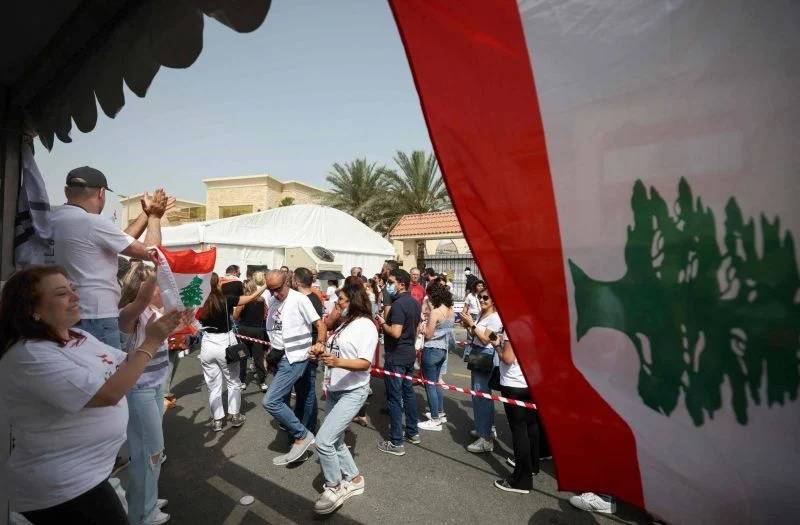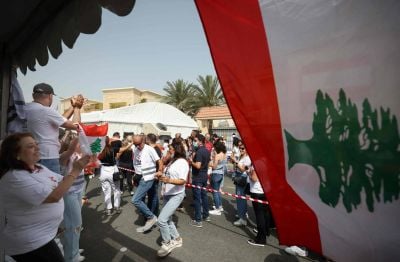
Lebanese voters in front of the Consulate General in Dubai on May 8, 2022. (Credit: Karim Sahib/AFP)
From Dubai to Paris, passing by Athens or Abidjan, a strong will to contribute to the “change” emanates from the Lebanese voters that L'Orient-Le Jour was able to reach on Sunday, the second day of the parliamentary elections organized for Lebanese expatriates, more than 194,000 of whom reside across 48 countries. On Friday, expatriates cast ballots in Iran and 10 Arab countries.
It was in Dubai that the electoral fervor seemed to be the strongest on Sunday morning. From the moment the voting center established at the Consulate General opened, a line of Lebanese, over a kilometer long, was filmed and shared on social networks, while temperatures soared over 35 degrees Celsius.
Long lines in Dubai
Jenny Baroud, an employee at the Lebanese High School in Dubai, has been living in the Emirates for 22 years. “I first came to the site at 7 a.m., but the line was too long. I came back at 9:30 and decided to wait at all costs,” she told L'Orient-Le Jour. I waited for about an hour and a half in 35 degree weather. Volunteers were passing by to give us water,” said the voter. “I am very proud to have voted for the candidates who convince me and who, I hope, will initiate a change in Lebanon," she confided.
Unlike Jenny, Carl Chalhoub, who has been working for a Lebanese company for seven and a half years, only lined up for a little over 30 minutes. “It was very well organized,” he says. In general, the candidates were discreet. “I noticed the presence of candidates Melhem Khalaf and Michel Helou [...] There were also representatives of ruling parties, but no slogans or patriotic songs. The local police were also watching,” Carl explains. According to him, the Lebanese youth in Dubai mostly vote for independent candidates. “But these young people are also aware of the need to use the ‘useful’ vote in some constituencies to dislodge the ruling parties, if the independents have no chance of being elected,” he says. By useful vote, he means voting for the Lebanese Forces against the Free Patriotic Movement, Hebzollah and their allies.
“I came to help the teams in Dubai. There is an incredible energy. Today, I believe in change more than ever. What is happening in Dubai is a hint of what could happen on May 15. All we hear is encouragement for the opposition and for change," explains Pascal Abchi, who does not vote in Dubai, but came to help the opposition movements to the traditional parties.
‘Change something’
Bechara Halabi voted in the city hall of the 16th arrondissement of Paris. A registered voter in the South Lebanon II constituency, he gave his vote to the “Towards Change” list supported by the opposition groups close to the protest movement. At 46 years old, it is the first time he has voted in legislative elections.
“They tried to persuade me that it was useless to vote, but I said to myself that it is time to try to change something. We are aware that there will be no radical change, but this is a first step towards change,” Bechara told L'Orient-Le Jour. If the opposition parties win seats in the elections, Bechara expects them to be united in a coalition to be able to stand up to the current government.
Georges Hachem is 31 years old. He also came to the city hall of the 16th. He is originally from the Chouf, and gave his vote to the “United for Change” list, which is close to the protest movement, and his preferential vote to the environmentalist candidate Najat Saliba. “I believe that we must vote for competence and get rid of this rotten political class. We, as a diaspora, have the duty to try to change the situation at least for those who stayed in Lebanon,” the young man says.
Cheryl Matar, a voter in Paris, is also calling for change. Her ballot will go for the "Beirut the change" list in the constituency Beirut II. “After the explosion of Aug. 4, 2020, after all that we have experienced in Lebanon, I think it is unacceptable today not to vote to try to make a change. Not to vote is to participate in the renewal of the same political class that has reigned for years,” she says. “Change doesn’t happen overnight, we all know that,” Cheryl adds.
‘I don't really believe in it’
Rita, like many other Lebanese, left Lebanon to settle in Athens a little less than a year ago, because of the crisis. It was a departure that she did not want, but that she considered necessary for the future of her children, who are still in school. She voted in the Greek capital Sunday morning, shortly before 9am.
“There were not many people, about 10 people in front of me. But the vote was rather well organized,” Rita says.
Rita, in her 40s, voted because, she says, she hopes that “[her] vote will bring the necessary change for Lebanon.” But, she quickly adds, “I don't really believe in it.”
Her skepticism is rooted in the “lack of unity among the new ‘heads,’” understanding the opposition to the traditional parties. “And many people I know will vote so-called ‘useful,’ that is to say, for the Lebanese Forces to counter the Gebran Bassil headed FPM or Hezbollah,” she adds.
Born in Abidjan, David Nassar, 29, tried to settle in Lebanon a few years ago. But he was “driven out by the crisis.” On Sunday, the young man who works in trade, went to vote with a 35-year-old engineer friend, recently established in Abidjan after having tried in vain to launch his business in Lebanon. Both vote in the constituency of Mount Lebanon IV, in the Chouf, and do not hide their sympathy for the opposition and the “thawra [revolution].”
For David, who sees pressure on voters from supporters of the Shiite movement Amal, voting “is a right but also a civic duty.” He hopes that these elections will “initiate a change in the political life in Lebanon, which must obey more rational rules, with a return to the institutions of the state rather than a sharing of the cake between political parties.”
Murr and Marada
In Cameroon, however, some Lebanese still plan to vote for traditional figures.
This is the case of Abdo Salim Hajal, a native of Jal al-Dib in Metn. This forester says he is voting for Michel Murr, the grandson of one of the Lebanese figures who embodied political clientelism.
“Our relationship with the Murr family goes back several decades and they have always supported us. Change? It's good, but we must know that it’s not ‘'kellon yaani kellon’ (all means all — the thawra’s slogan). The guilty must pay, but the good people must be recognized as such,” says Abdo.
Elie Khawaja, originally from Zgharta, works in industry in Cameroon. “I am voting for Tony Frangieh, to express my solidarity with him and his family. We have always voted for them, they have always served their village and their community well,” says this Lebanese Marada Movement supporter.
This article was originally published in French in L'Orient-Le Jour.
